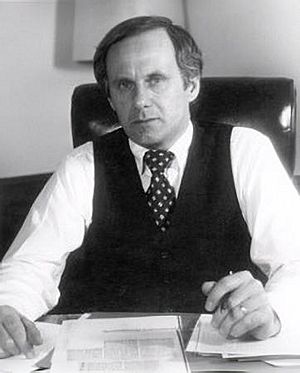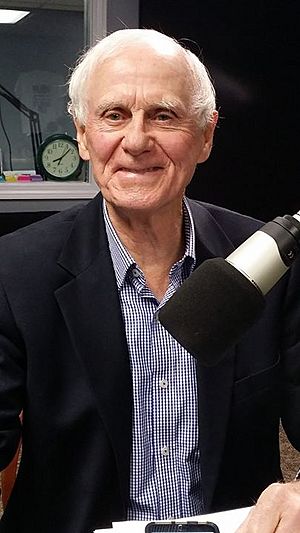Gordon J. Humphrey facts for kids
Quick facts for kids
Gordon J. Humphrey
|
|
|---|---|
 |
|
| United States Senator from New Hampshire |
|
| In office January 3, 1979 – December 4, 1990 |
|
| Preceded by | Thomas McIntyre |
| Succeeded by | Bob Smith |
| Member of the New Hampshire Senate from the 17th district |
|
| In office December 5, 1990 – December 2, 1992 |
|
| Preceded by | William A. Johnson |
| Succeeded by | John Barnes Jr. |
| Personal details | |
| Born |
Gordon John Humphrey
October 9, 1940 Bristol, Connecticut, U.S. |
| Political party | Republican (before 2016) Independent (2016–present) |
| Spouse | Patricia Green |
| Education | George Washington University University of Maryland, College Park |
Gordon John Humphrey (born October 9, 1940) is an American politician. He is from the state of New Hampshire. He served two terms as a U.S. Senator for the Republican Party. His time in the Senate was from 1979 to 1990. He also ran for Governor of New Hampshire twice.
Contents
Early Life and Education
Humphrey was born in Bristol, Connecticut. His first career was in aviation. He served in the United States Air Force for several years. After college, he became a professional pilot. He studied at George Washington University and the University of Maryland, College Park.
Humphrey once said he changed his political views. He started as a liberal. Then he became a conservative because of his "own logic." In 1977, he became a leader for a group called the Conservative Caucus in New Hampshire. He helped organize events and gather signatures for petitions.
Time in the U.S. Senate
Becoming a Senator
In 1978, Gordon Humphrey won an election for the U.S. Senate. This was surprising because he was only a local activist. He did not hold any political office before this. He defeated the current Senator, Thomas J. McIntyre, by a small amount. Humphrey's campaign lasted 18 months. He ran it mostly by himself and Patricia Green. She was a former teacher whom he later married.
Humphrey was easily reelected in 1984. He won against Norman D'Amours, a five-term Democratic congressman. Humphrey decided not to run for a third term in 1990. He had promised to serve only two terms.
Important Senate Roles
As a Senator, Humphrey was known for speaking his mind. He served on important committees. These included the Committee on Foreign Relations and the Armed Services Committee. He was also on the Judiciary Committee.
He was a leader in the Congressional Task Force on Afghanistan. This group helped shape U.S. policy during the Soviet–Afghan War. Humphrey voted against the federal budget every year he was in the Senate. He did this because the proposed budget always had a deficit.
Role at the 1988 Republican Convention
Humphrey played a big part at the 1988 Republican National Convention. He was a leader for conservative delegates. He helped make sure Dan Quayle was chosen as the vice-presidential candidate. Humphrey and other conservatives wanted a candidate who shared their views. Quayle's selection satisfied Humphrey.
Later Political Career
On March 5, 1989, Humphrey announced he would not seek a third Senate term. He felt two terms were enough. Instead, he ran for and won a seat in the New Hampshire State Senate in 1990. He served one term there. There were talks about him running for president in 1988 and 1992, but he did not.
Humphrey returned to New Hampshire politics in 2000. He challenged the current Governor, Jeanne Shaheen. He lost this election. He ran for governor again in 2002. He finished third in the Republican nomination race. He said this campaign would be his last.
After Politics
In 2004, Humphrey started working in radio. He bought a radio station in Concord. He lives in Chichester, New Hampshire with his wife, Patricia. They have two children.
Support for Edward Snowden
In 2013, Humphrey supported whistleblower Edward Snowden. Snowden revealed information about government surveillance. Humphrey believed Snowden did the right thing. He felt Snowden exposed a "massive violation" of the U.S. Constitution. Humphrey called Snowden a "courageous whistle-blower."
2016 Presidential Election
In 2015, Humphrey supported John Kasich for President. Kasich was the governor of Ohio. During the 2016 Republican primary elections, Humphrey tried to stop Donald Trump from getting the nomination. He later endorsed Hillary Clinton, the Democratic candidate. In November 2016, Humphrey left the Republican Party. He became an independent politician.
Calling for Donald Trump's Removal
On August 9, 2017, Humphrey called for President Trump's removal from office. He wrote a letter to his Congress member, Ann McLane Kuster. He argued that Trump was "sick of mind" and dangerous.
 | Bayard Rustin |
 | Jeannette Carter |
 | Jeremiah A. Brown |


